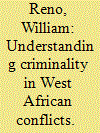| Srl | Item |
| 1 |
ID:
181671


|
|
|
|
|
| Summary/Abstract |
Although rebel groups are players on the international stage, little is known about their financial strategies at this scale. Existing research suggests that rebels succeed in cross-border trade by using informal networks that evade state authority. Yet rebels face a critical challenge: they operate in a normative environment that values state recognition and penalizes their illegitimate status. New evidence reveals that rebels can overcome this barrier and better connect to global economies not by evading the state but by infiltrating its institutions. Drawing on unprecedented data—the internal records of armed groups and their trading partners—I examine how rebels use state agencies in conflict zones to manufacture a legal cover for wartime trade. By using state agencies to provide false certification, rebels can place the stamp of state on their trade deals. This strategy of legal appropriation is a fundamentally different model of how conflict markets skirt sanctions and connect to global buyers. I develop a framework for how this strategy works that traces how international sovereignty norms and sanctions regimes create incentives for rebels, firms, and bureaucrats to coordinate around this legal veneer across the supply chain. The framework and evidence contribute theoretical and policy understandings for rebel governance, state building and fragmentation, and illicit global markets.
|
|
|
|
|
|
|
|
|
|
|
|
|
|
|
|
| 2 |
ID:
155924


|
|
|
|
|
| Summary/Abstract |
This article explores the ambiguous role of coastal smuggling during the first decade and a half of Communist rule (1949–65). Fearing that the illicit flow of commodities siphoned critical revenues and undermined foreign policy, Communist China repurposed and expanded Nationalist China's war on smuggling while employing novel tactics of mobilization. Yet smuggling was not just a threat; it was also a lifeline that alleviated widespread material shortages and supplied the everyday needs of individuals and firms during the tumultuous transition to central planning. Businesses from ‘underground factories’ to state-owned enterprises relied on black markets to meet ambitious production targets and circumvent bottlenecks in official supply channels. Smuggling was thus more than just ‘corruption’ practised by officials—it was also a ‘creative accommodation’ employed by broad swaths of social actors coping with the enormous changes. This article argues that the nascent command economy and the vibrant underground economy existed symbiotically rather than antagonistically. Exploration into this complex relationship reveals many cross-border connections between Communist China and the capitalist world that both complemented and undermined domestic state consolidation.
|
|
|
|
|
|
|
|
|
|
|
|
|
|
|
|
| 3 |
ID:
106140


|
|
|
|
|
| Publication |
2011.
|
| Summary/Abstract |
This special issue focuses on a phenomenon studied by only a handful of organised crime scholars to date - criminal group mobility. The contributions in this issue evolved out of discussion papers commissioned by the Department of Public Safety Canada in 2010 for the 12th National and 15th International Metropolis conferences, and cover a wide variety of economic, social, and law enforcement issues related to the mobility of criminal groups. In this introductory article, we provide the general background and context for the collection, as well as a brief overview of each of the four papers. It is our hope that this special issue will inspire further rigorous research on this important topic, as well as help contribute toward the development of effective strategies for preventing the spread of organised crime.
|
|
|
|
|
|
|
|
|
|
|
|
|
|
|
|
| 4 |
ID:
086194


|
|
|
|
|
| Publication |
2009.
|
| Summary/Abstract |
Most standard analyses and policies aimed at peacekeeping and post-conflict reconstruction in West Africa understand members of armed groups, and especially their leaders who engaged in illicit commerce, as criminals. This analysis and the policies that follow from it miss the extent to which these transactions now contribute to the construction of new political relationships and are seen by those who participate in them as one of the few avenues for active participation in the post-war economy and politics. This article explains how illicit commerce underlies new political relationships in West Africa. It shows how measures to disrupt these transactions can destabilize politics. But often those who participate in illicit markets prove able to manipulate externally imposed measures and assert their own interests.
|
|
|
|
|
|
|
|
|
|
|
|
|
|
|
|